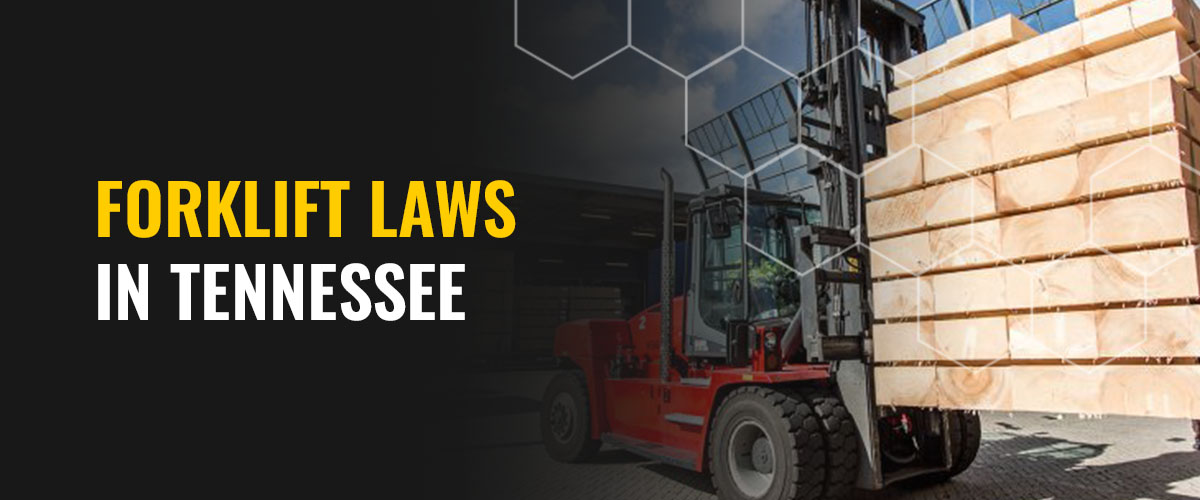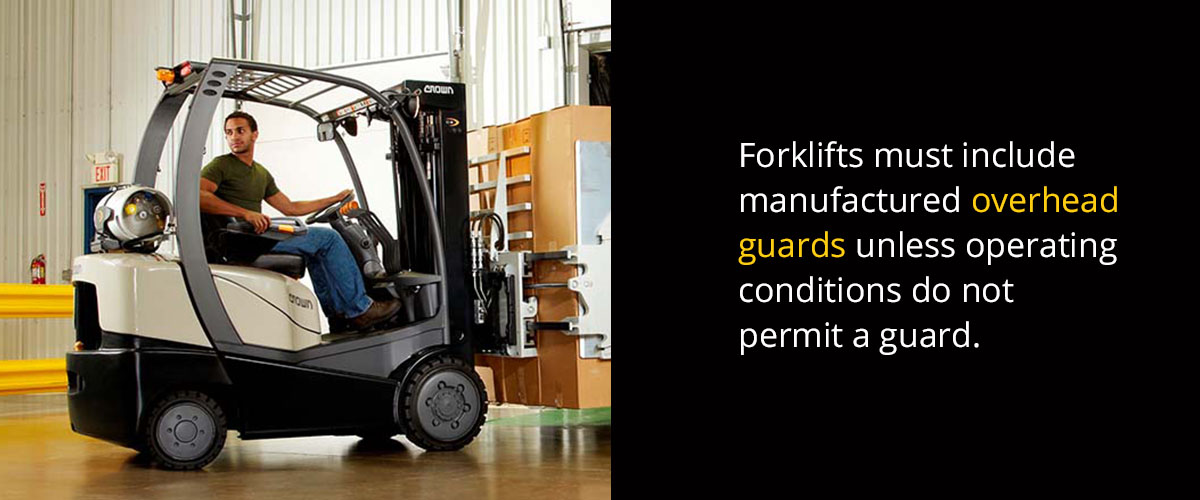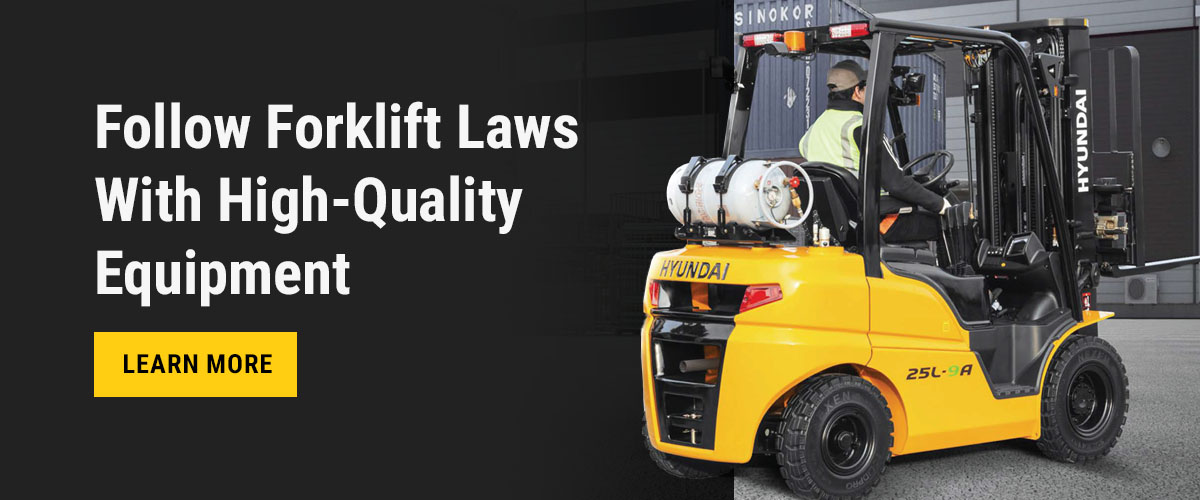
Forklift Laws in Tennessee
To follow Tennessee law, forklift operators must adhere to essential operational regulations. Forklift laws protect forklift operators and other employees. Safety regulations require forklift operators to receive proper training, operate forklifts in safe environments, maneuver forklifts safely, and maintain them properly. Forklift laws also require forklifts to have the proper design and labels to ensure they are manufactured correctly for safe operation.
Why Are Forklift Laws Important?
Forklift laws are important because they protect forklift operators and surrounding pedestrians from injury. Forklifts are involved in thousands of industrial accidents each year. Excessive speed or imbalanced loads can cause forklifts to tip over, and unsecured loads can fall off forklifts. Workers are also at risk of collisions, falls, and carbon monoxide exposure. Forklift laws keep employees safe, prevent forklift and facility damage, and reduce risks.
What Are the Tennessee OSHA Regulations for Forklifts?
The United States Occupational Safety and Health Administration (OSHA) outlines regulations for forklift handling and operation to ensure safety. To maintain compliance with Tennessee forklift laws, you must adhere to the following regulations:
Proper Design and Labels
Forklifts must meet the construction and design requirements outlined in the American National Standard for Powered Industrial Trucks. They must also display an identifying mark or label that indicates laboratory testing approval.
If you are operating a forklift, you must also maintain Tennessee forklift attachment compliance. A forklift should have an identifying mark if it has front-end attachments that were not factory-installed. The identifying mark must identify the front-end attachments and the approximate weight of the truck with the attachments when it has a laterally-centered load at maximum elevation.
Safe Operation
Trained and certified operators are the only individuals who should drive and operate forklifts or ride in forklifts. Untrained and uncertified individuals cannot ride in forklifts even while trained operators drive them.
Workers must remain clear of the elevated parts of forklifts and avoid walking or standing under them. This regulation applies whether a forklift is loaded or not. OSHA also requires forklift operators to travel slowly on grades and maintain safe distances between trucks. Operators must drive with minimal speed to facilitate safe stopping, and they should only handle safely arranged loads within the proper weight limit.
Fuel Storage and Handling
Forklift handlers must follow the Flammable and Combustible Liquids Codes Guidelines from the National Fire Protection Association (NFPA) to store and handle fuel. This regulation applies to diesel fuel, gas, and propane.
Safety Guards
Forklifts must include manufactured overhead guards unless operating conditions do not permit a guard. If forklift loads present hazards, operators must equip forklifts with manufactured vertical load backrest extensions.
Charging and Changing Storage Batteries
To safely charge and replace storage batteries, operators must do the following:
- Keep designated battery charging stations available at all times.
- Only charge batteries in designated charging stations.
- Only charge batteries when forklifts are completely deactivated.
- Use an overhead hoist or conveyor to handle batteries.
- Properly store and maintain recharged forklift batteries.
- Replace defective battery vent caps.
- Restrict all employees from smoking in the battery charging area.
- Always maintain proper lighting in battery charging and forklift operation areas.
- Use auxiliary lighting when standard lighting produces less than two lumens per foot.
- Provide facilities for neutralizing and flushing spilled electrolytes to protect employees, trucks, and the charging apparatus from fire, damage, and fumes.
- Use a siphon or carboy tilter to handle electrolytes.
- Properly position reinstalled batteries in the forklift.
- Pour acid into water and avoid pouring water into acid when charging batteries.
- Properly position forklifts and apply brakes before charging or changing batteries.
- Open compartment or battery covers to dissipate heat, and check to ensure vent caps are functioning.
- Take precautions to prevent sparks, electric arcs, and open flames in battery charging areas.
- Keep all metallic objects, such as tools, away from the tops of uncovered batteries.
Seat Belt Safety
While there are no specific Tennessee forklift seat belt laws, regular seat belt laws apply. Additionally, OSHA includes precautions to help forklift operators remain safe. Forklift operators are at risk of collisions, forklift tip-overs, and falls. For this reason, OSHA requires forklift operators to wear a seat belt while operating any forklift that has one.
Tennessee Forklift Training Laws
OSHA also outlines essential forklift training requirements for training programs, their covered topics, and renewal training programs. OSHA requires forklift training programs to train individuals using practical training, written instruction, and a skills evaluation. Only individuals with the training, experience, and knowledge to train operators should deliver instruction, directly supervise trainees, and evaluate their competence.
Training must occur in a safe location where forklift operation does not place trainees or other employees at risk. Formal instruction may include lectures, written material, discussions, videos, and interactive computer learning. Trainers must also deliver practical training by performing demonstrations and instructing trainees to perform practical exercises. Training should cover the following topics unless employers can demonstrate that they are not applicable to safe forklift operation in the workplace:
- Operating precautions, warnings, and instructions for the forklift trainees will use, including those listed in the operator’s manual
- Location, function, and handling instructions of forklift instrumentation and controls
- Differences between forklifts and automobiles
- Steering and maneuvering
- Motor or engine operation
- Visibility and handling visibility restrictions while loading
- Fork and attachment adaptation, use limitations, and operation
- Forklift stability and capacity
- Operating limitations
- Any forklift inspection and maintenance tasks the operator will need to perform
- Proper refueling or battery charging and recharging procedures
Trainers must also cover the following workplace-related topics during training:
- Surface conditions where trainees will operate forklifts
- Load stability and composition
- Load stacking, unstacking, and manipulation
- Restricted areas, narrow aisles, and hazardous areas operators may encounter
- Pedestrian traffic where trainees will operate forklifts
- Sloped surfaces such as ramps that can affect a forklift’s stability
- Areas where poor forklift maintenance or insufficient ventilation could cause diesel exhaust or carbon monoxide to build up.
- Any potentially hazardous environmental conditions that can affect workplace safety and safe forklift operation
Follow Forklift Laws With High-Quality Equipment
Following OSHA forklift regulations is crucial to maintaining safety and complying with Tennessee forklift laws. OSHA requires forklifts to be designed and manufactured to meet regulations, and ensuring you operate only the highest quality equipment protects your employees from potential harm.
Thompson Lift Truck is one of the country’s leading forklift dealers. We supply Tennessee companies with quality forklifts, parts, and services that meet their needs and comply with regulations. Request a quote to learn more about how Thompson Lift Truck can provide you with the forklifts and services you need.



